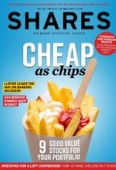Archived article
Please note that tax, investment, pension and ISA rules can change and the information and any views contained in this article may now be inaccurate.
Fund gurus view emerging markets as a major prize

Consumer goods giant Unilever (ULVR) has increased its dividend at a very impressive 8% compound annual growth rate since 1962. Its significant cash generation capability was one of the many reasons why Kraft Heinz tried to buy the FTSE 100 business earlier this year.
‘Thank goodness that transaction didn’t go through,’ says Nick Train, one of the UK’s most famous fund managers.
Many people would rejoice if someone offered above market rate for one of their investments. Not Train; he calls Unilever a ‘compounding wonder’ and a ‘dividend machine’. It is clearly an investment he wants to keep holding across his range of funds for many years to come.
Speaking at an event on 26 April in London alongside Terry Smith, another well-known fund manager, Train says dividend growth for constituents of his Finsbury Growth & Income Trust (FGT) is currently ‘as high as I can ever remember in my career.’
Unilever is the biggest holding in the fund, representing about 10% of the portfolio.
The real reason behind Kraft's bid?
Train has a hunch that Kraft was mainly interested in acquiring Unilever for its strong emerging markets position. As a reminder, emerging markets have attractive demographics and growing spending power of middle class consumers.
‘(Emerging markets) would be the real strategic prize. Kraft only generates 10% of its revenue in emerging markets, compared to nearly 60% for Unilever,’ says Train.
This theory has led the fund manager to load up on shares in Nasdaq-listed Mondelez, best known as Kraft’s former snack foods business which was demerged in 2012.
‘Kraft Heinz generates 70% of its business in North America. Mondelez is almost the mirror image with 80% of revenue outside of the US. Right at the heart of the business is the Cadbury brand and the distribution presence in emerging markets.’
True value of compounding machines
Train says investors should now give more serious consideration to what ‘rare compounding machines’ like Unilever are truly worth. He cites US investor Warren Buffett as describing US long bonds as ‘entities on a 40 times multiple with no growth’.
‘If Buffett is correct, surely Unilever’s 20 times earnings multiple and 5% to 6% annual growth still makes its shares look a give-away,’ Train comments.
Terry Smith shares Train’s enthusiasm for emerging markets and Unilever, in particular, although his method of getting exposure to emerging markets’ consumer spending trend is slightly different.
Smith runs two funds: Fundsmith Equity (GB00B41YBW71) and Fundsmith Emerging Equities Trust (FEET). Both funds are united in their desire to invest in companies with a high return on capital employed; are growing; and whose shares trade on either a reasonable or cheap valuation.
The different way to access big names
The key difference is Fundsmith Equity generally invests in big corporations whereas its smaller counterpart is only focused on companies which generate their earnings from emerging markets.
What’s not obvious at first glance is Fundsmith Emerging Equities’ investments are often (but not exclusively) the local subsidiary of a multinational business.
Its exposure to Unilever is through the Indonesian-listed subsidiary of the consumer goods giant. Other stocks linked to well-known corporate giants in its portfolio include East African Breweries (the Kenyan subsidiary of Diageo (DGE)), Colgate Palmolive India, Nestle India and the Mexican subsidiary of $45bn personal goods group Kimberly-Clark.
‘Many of the local subsidiaries have significantly higher return on capital employed versus their parent,’ says Smith, explaining why the emerging markets fund has chosen to invest in the smaller counterparts.
Exceptions to the rule
He says this local focus enables the emerging markets fund to invest in certain sectors which he wouldn’t dream of touching with the mainstream Fundsmith Equity product. ‘For example, brewers aren’t in our main fund because that industry is not susceptible to economies of scale, but we have some in the EM fund.’
Smith views brewing as a local business as products are low value, perishable, might get damaged if transported around the world and brand strength lies in the local market. ‘Some of the largest beer brands – and brewers with the highest returns – are found in the developing world.’
It’s a similar story for retail. That sector is off limits for Fundsmith Equity as Smith believes the combination of low margins and high fixed costs can be ‘disastrous’ in low and slowing growth environments.
However, the developing world is still full of ‘mom and pop’ stores, says the fund manager. He believes that presents an opportunity for formal retailers to grab market share, hence why Fundsmith Emerging Equities invests in retailers such as Mr Price in South Africa.
Money making target
Like Nick Train, Terry Smith wants to invest in companies capable of generating lots of profit that can be reinvested in the business and then create even more value. This compounding effect should ultimately make investors lots of money.
Finsbury Growth & Income’s 10.8% annualised total return over the past 10 years shows Train has clearly made money for shareholders. Smith is still establishing his track record with emerging markets given his Fundsmith product has only increased by 13% in price since launching just under three year ago.
‘It’s been a frustrating run but we’ve made a modest amount of money for investors,’ he concludes. Patience is clearly required. (DC)
DISCLAIMER: The author has personal investments in both Fundsmith funds referenced in this article.
Important information:
These articles are provided by Shares magazine which is published by AJ Bell Media, a part of AJ Bell. Shares is not written by AJ Bell.
Shares is provided for your general information and use and is not a personal recommendation to invest. It is not intended to be relied upon by you in making or not making any investment decisions. The investments referred to in these articles will not be suitable for all investors. If in doubt please seek appropriate independent financial advice.
Investors acting on the information in these articles do so at their own risk and AJ Bell Media and its staff do not accept liability for losses suffered by investors as a result of their investment decisions.

 magazine
magazine










